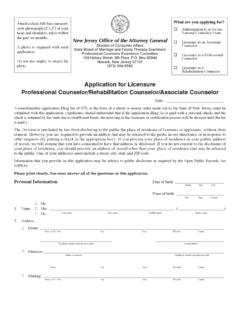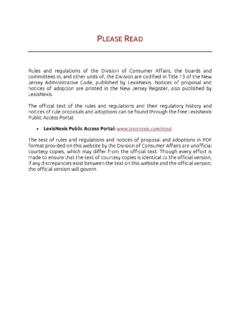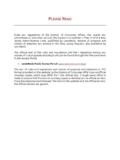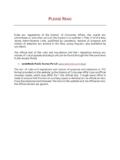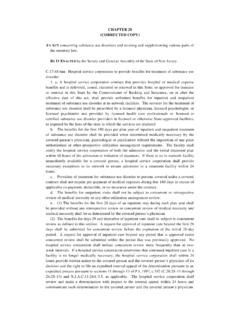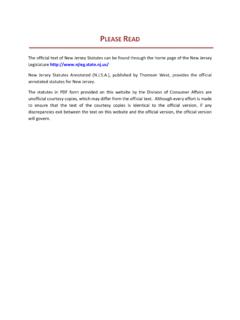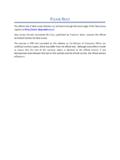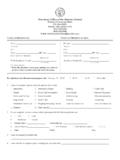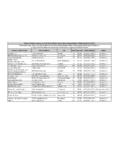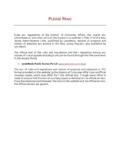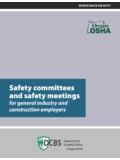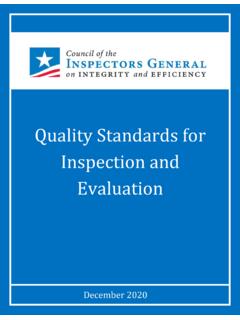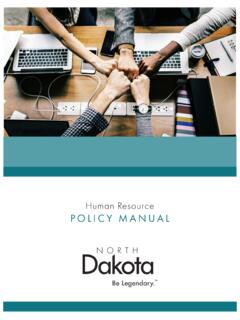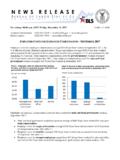Transcription of 04 15 14 Best Practices - New Jersey Division of Consumer …
1 This document, Best Practices for Health Care Service Firms, is advisory only, though it may serve as the basis for regulation development in the future. Personal care services, though frequently characterized as "nonmedical" services, may require touch or physical contact to support a client with activities of daily living such as feeding, toileting, bathing, dressing, grooming, transferring, ambulating, etc. The "Best Practices for Health Care Service Firms" has been developed as a supplemental resource to administrators and employees of Health Care Service Firms in the State of New Jersey for the delivery of personal care services. This document incorporates statutory and regulatory provisions and provides non-binding, optional best Practices to aid Health Care Service Firms in the delivery of these services.
2 To the extent, if any, that this document conflicts with or exceeds the requirements of 34:8-43 et seq. or 13 et seq., such laws and regulations govern the conduct of HCSFs. Notwithstanding use of the terms shall or required" in the Best Practices , the contents remain aspirational only. Best Practices for Health Care Service Firms April 15, 2014. I. Definitions 1. Date means day, month and year. 2. Licensed means holding a valid, current New Jersey license, certification or registration, required by law as a precondition to the practice of a regulated profession or occupation. 3. Director of Nursing/Health Care Services Supervisor (DON/HCSS) means a New Jersey Board of Nursing licensed registered nurse with education and community health nursing experience and progressive management experience in community health nursing, who is responsible for the clinical oversight of a Health Care Services Firm's (HCSF) health care services program.
3 4. Nurse Supervisor means a New Jersey Board of Nursing licensed registered nurse with education and community health nursing experience with progressive responsibilities in community health nursing. The Nurse Supervisor is assigned by the Director of Nursing/Health Care Services Supervisor to oversee services rendered by employees, including other registered nurses (RNs), licensed practical nurses (LPNs), certified homemaker home health aides (CHHAs). The Nurse Supervisor or a registered nurse designee shall be available on call during all hours of service. The Nursing Supervisor and the Director of Nursing may be one and the same person. 5. Signature means at least the full name (first and last) and title (for example, RN, LPN, CHHA) of a person, legibly written either with his or her own hand , generated by computer with authorization safeguards, or communicated by a facsimile communication system.
4 If the signature is not legible, the individual's full name shall be printed in an adjacent space. When a signature is required, it shall be followed by a title (for example, RN, LPN, CHHA), which may be pre-printed on a form. 6. Health care services means those tasks performed for the purpose of maintaining or restoring a patient's physical or mental health, for which the individual performing the task must be licensed and/or certified. Personal care services are included in health care services. 7. Personal care services means those tasks for the purpose of assisting a patient with the activities of daily living, including assisting with feeding, toileting, bathing, dressing, grooming, transferring, ambulation, exercise or other aspects of personal hygiene.
5 These services are a subset of health care services. Personal care services do not include tasks relating to housekeeping, meal preparation, shopping, laundry, cleaning or transportation services which may be performed by unlicensed persons. 8. Community health nursing means professional nursing practice emphasizing health promotion, health maintenance, primary prevention, health education and management, coordination of health care services, and continuity of care for individuals, families, and groups in the community. It includes, but is not limited to, home visits to assess, plan for, and provide nursing services; health guidance and direct care; and coordination of services with community resources, families and other health professionals and paraprofessionals.
6 9. On call means available to respond to questions concerning services via electronic communication or telephone, but does not require that the on-call individual be available to personally visit the patient. II. Clinical Policies Intake Interview and Initial Assessment The HCSF, by or through its DON/HCSS, assigns a nurse, office manager or other responsible staff member the task of conducting an intake interview with the patient and/or family/significant-other. Patient-care assignments may be initiated for patients who are discharged from a health care facility, in those situations where a nurse case manager assessed the immediate care needs of the discharged patient and communicated those needs to the HCSF through the DON/HCSS or the RN on call.
7 Based on this communication, the DON/HCSS or RN on call assumes responsibility for appropriately delegating health care and personal care services during the first 24 to 48 hours pending the patient's in-person nursing assessment by the designated RN. Prior to starting all other patient-care assignments (not initiated immediately following discharge from a health care facility), an in-person nursing assessment of each patient, by an RN, should be conducted to establish a baseline of the patient's physical and functional status and identification of the level of services needed to meet the patient's needs. Required Intake Interview Documentation: The HCSF shall maintain documentation that includes, at a minimum: 1. Full name of patient 2.
8 Date of birth 3. Gender 4. Primary Care Provider and/or other health care professional contact information, including name and phone number 5. Past medical history, if known 6. Nursing and medical diagnosis(es) or problem(s), if known 7. List of medications, if known 8. Functional status, if known 9. Family/Significant-Other contact information, including name, phone number and relationship to the patient 10. Identification of services in place, additional services needed, and collateral contacts, if applicable, and 11. Name, date and signature of person conducting intake. If the patient's medical history, diagnoses, medications and functional status are not known, the documentation should reflect that an attempt was made to obtain that information.
9 Required In Person Assessment Documentation: The HCSF, by the DON/HCSS, or a Nurse Supervisor assigned to the task by the DON/HCSS, shall conduct an in-person nursing assessment of the patient to determine the tasks that are to be delegated to an assigned CHHA, prior to the start of service, or in the case of a patient discharged from a health care facility within 24 to 48 hours of the start of service. The HCSF shall maintain documentation that includes, at a minimum: 1. Vital signs, including temperature, pulse, respiration, blood pressure, and a pain assessment 2. Past medical history 3. Nursing and medical diagnosis(es) or problem(s). 4. List of medications 5. Functional status 6. Psycho-social review relevant to the Plan of Care 7.
10 A systems review (neurologic, musculo-skeletal, integumentary, cardiovascular, pulmonary, gastro-intestinal, genito-urinary). 8. Nutritional status, including diet 9. Home safety review, including fall risk assessment 10. Emergency plan 11. Advance directives 12. Primary Care Provider's Certification of Need for Services, if applicable, and 13. Date and signature of the Nurse Supervisor conducting the assessment. Plan of Care The HCSF, by and through its DON/HCSS, or a Nurse Supervisor assigned to the task by the DON/HCSS, shall develop a Plan of Care based on the in-person nursing assessment, prior to the start of service, or in the case of a patient discharged from a health care facility within 24 to 48 hours of the start of service.
